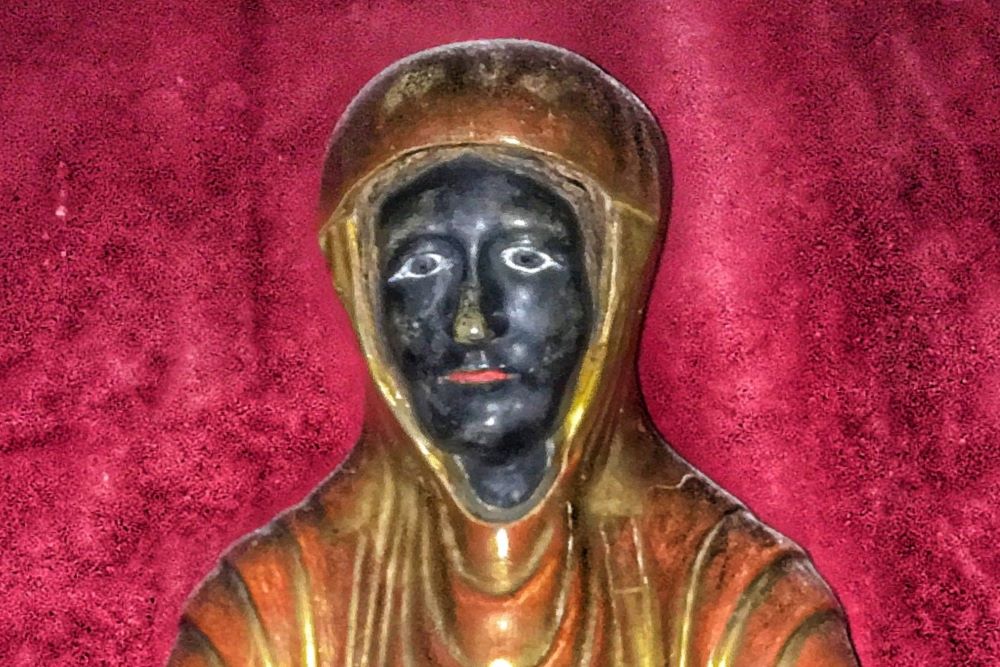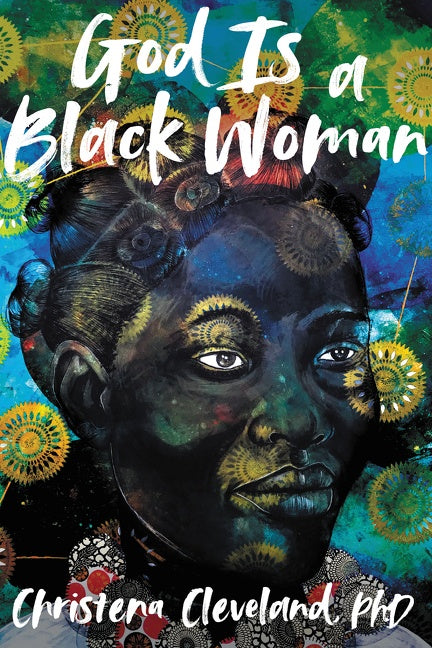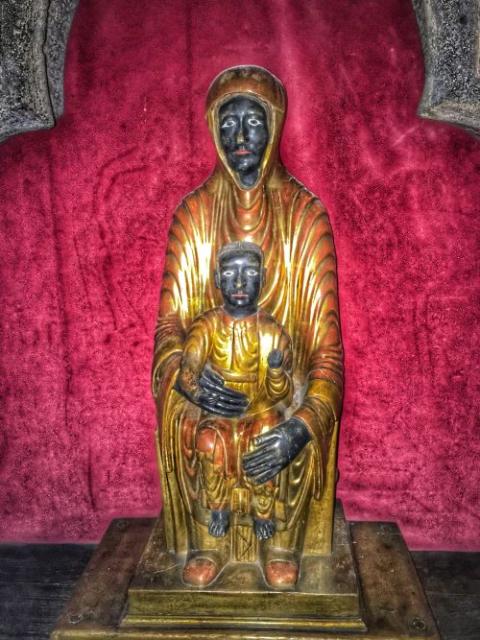
A detail from Our Lady of the Good Death at the Cathedral of Our Lady of the Assumption of Clermont-Ferrand, France (Courtesy of Christena Cleveland)
In her third book, God Is a Black Woman, social psychologist and theologian Christena Cleveland invites us to accompany her on a journey. Actually – three journeys.
The first is her physical journey across France as she visits over a dozen Black Madonnas. The second is her spiritual journey away from the confining, punishing "whitemalegod" of her youth toward a loving, all-encompassing Divine Black Feminine who does not recoil at our need but embraces us in our imperfection. Finally, she brings us along on the journey of her own life, from a childhood as a minister's daughter, through the challenges of growing up in the grip of a patriarchal purity culture, to the adult realization that she had everything she needed inside her all along.

Through these intertwined journeys, Cleveland also shares the gift of her soul-searching and its fruits – self-love, the knowledge that God is who we need God to be and how to bring a 2-foot statue home on an airplane.
God Is a Black Woman is at once challenging, revelatory and nourishing. It is akin to having a conversation with your smartest friend, the person who can make you think about something that seemed mundane in a whole new light. Why does our society frame God not only as male but as specifically a white male? How does that perception of God shape our perception of one another? Of ourselves? Of our own value? How do those of us who are neither white nor male see ourselves as made in the image of God when surrounded by societal cues telling us that He is not of, with or for us? And how does the concept of a white male God impact those with privilege?

A detail from Our Lady of the Good Death at the Cathedral of Our Lady of the Assumption of Clermont-Ferrand, France (Courtesy of Christena Cleveland)
These deep questions are accompanied by the author's recollection of how the concept of the whitemalegod impacted her as a child and young woman. We meet her fasting at age 5 in order to prove herself worthy of a good husband and are asked to contemplate why a husband was the only prize worth fasting for. We meet her again as a teenager told that if she does not look a certain way (that way being an unrealistic and unattainable standard of beauty based specifically on white women) no man will want to marry her and are asked to sit with why that might be and what a Black woman could possibly do about it. We see a Black woman who has learned that to be palatable to whitemalegod, she must present herself as perfect and without need in order to secure a place in a hierarchy that is designed on a model of Black and female inferiority.
But God Is a Black Woman is not just deep questions and soul-searching.
As she makes her way, on foot, across France to visit different Black Madonnas, we are invited to accompany Cleveland’s physical journey as well. From getting caught in the rain, to discovering a hidden mountain spa, to hiding from French police after tripping an alarm as she tried to get closer to the Black Madonna of Mauriac, she shares the good and the bad. The journey is imperfect, as is she, as are we all. Where the solely white and male God of her youth was aloof and impenetrable to all but the perfect, Cleveland’s Black woman God could be present in the inherent messiness of life, at the intersection of Blackness and womanhood, and exude love no matter what.
Advertisement
God Is a Black Woman invites us to think critically about how we perceive God, and why, and what that means for us and those around us. Some readers may find Cleveland’s assertion that God is a Black woman uncomfortable. They should consider why that might be. Why does a white male God strike us as "normal" or unremarkable, but a Black female God seem challenging? In asserting that God is a Black woman, Cleveland is telling us that those of us at the bottom of the hierarchy in American society are made just as much in the image of God as those at the top.
Throughout this thought-provoking, revealing and challenging book, Cleveland elucidates the lessons she learned, and continues to learn, as she embraces the God of the side-eye, of thick thighs, of the intimate knowledge of loss, mistreatment, suffering, and making a way out of no way. Like Christian in A Pilgrim's Progress, we are invited along for the journey in God Is a Black Woman as the author breaks from her past in an effort to find "Life! Life! Eternal Life!"








